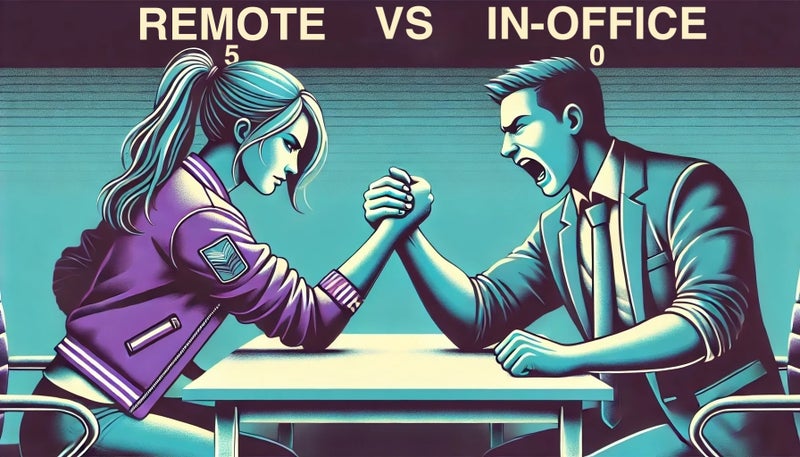Contents
- Difference #1: Schedule Control
- Difference #2: Team Diversity
- Difference #3: Deep Work
- Difference #4: Life Integration
- Difference #5: Career Acceleration
- Work from Home vs Work from Office? No Contest
Is the work-from-home vs work-from-office debate missing the point? The truth is it's more than just GPS coordinates. It's about what those coordinates enable.
It's 3 PM and you're staring at the clock again.
The daily ritual continues.
- Drag yourself out of bed
- Fight through rush hour traffic
- Start work already exhausted
- Dodge endless quick syncs
- Watch your peak hours slip away on the commute home
Fighting your natural rhythm, navigating a forced work schedule, constant interruptions - they're all part of the game... aren't they?
For some reason, the work from home vs work from office debate always seems to land on location. But the reality is there's a lot more at stake.
Choose right and you're looking at peak performance WITH work-life balance. Choose wrong and you're signing up for years of watching that office clock tick by.
Ready to make the smart choice? We're here to help with 5 key differences that actually matter in the work from home vs work from office debate.
Difference #1: Schedule Control
AKA: Work When You're at Your Best
Office life runs on industrial-era rules.
Show up at 9. Leave at 5. Squeeze your actual life into whatever's left.
Sure, you might be most creative at 7 AM or most focused at 8 PM, but that doesn't matter. The office work schedule rules all.
Remote work flips this on its head. Its flexible work arrangement means your peak hours become your work hours.
Early birds get to crush deep work at 6 AM and night owls get to schedule focus time when others are wrapping up.
Drop kids off in the morning, hit the gym at midday or visit grandma early afternoon. It's up to you.
When you can align your work schedule with your life and natural rhythm, you get more work done with higher energy and better focus.
It's all about working smarter.
Difference #2: Team Diversity
AKA: Talent Has No Zip Code
The in-office work model limits companies to whoever happens to live within commuting distance.
Think about it - you're working with the best people who live near your office. Not the best people, period.
Remote work blows this constraint away.
When companies hire remotely, they tap into a whole different talent pool.
But this isn't just about meeting DEI quotas. It's about bringing fresh perspectives to old problems.
When your team spans continents and cultures, you get better ideas, stronger problem-solving, and much higher innovation.
Bonus Point: Remote work lowers barriers for underrepresented groups. They see 15% more applications from women and 33% more from minorities.
Difference #3: Deep Work
AKA: Focus vs Fragmentation
The office is an interruption factory.
Every shoulder tap, every quick sync, every impromptu meeting fragments your focus. You're not working - you're constantly recovering from distractions.
At home, you get to lay claim to your own work environment.
No drive-by meetings. No loud colleagues. No pointless status updates.
Just you and your work, the way it should be.
That's why 67% of fully remote workers rate their productivity as high, compared to 54% in hybrid work. Remote workers save an astounding 62 hours annually just by avoiding office interruptions.
The point: When you can truly focus, you can truly deliver.
Difference #4: Life Integration
AKA: Beyond the Work-Life Battle
Office work holds your life hostage.
Two and a half hours fighting traffic, eight hours at a desk, then whatever energy you have left for your actual life. It's really no surprise only 38% of office workers rate their work-life balance as above average.
Remote work's flexibility breaks these chains.
No commute and remote work's flexible hours mean your work and life don't need to be mutually exclusive.
You can be there for family dinner, hit the gym when it works for you, and get that early night you've been promising yourself.
The result? 78% of workers with some remote flexibility rate their work-life balance above average.
Difference #5: Career Acceleration
AKA: Your Skills, No Limits
Making an in-office choice chains your career to your location.
That dream role better be within commuting distance. That dream team better be worth uprooting your life over.
Remote work breaks free of location boundaries.
Silicon Valley, Austin, London, or anywhere in between, true remote work brings them all within reach. No relocation required.
This isn't just convenient - it's career rocket fuel.
When you can compete for the best jobs in the world, not just the best jobs nearby, you're only limited by the quality of your work.
Work from Home vs Work from Office? No Contest
Don't make the mistake of thinking the WFH or work from office debate is all about location.
Location is an enabler of something WAY bigger. WFH is about working in a way that maximizes your potential AND respects your life.
The debate is long since over.
Remote work's flexible hours, high-level control, and borderless opportunities make it the clear winner.
Remote workers are reportedly 20% happier than their office-bound counterparts. And it's not hard to see why.
A work schedule that works with your natural rhythms. A more diverse, higher-powered team. More space for deep work. Better work-life balance. Bigger and better global opportunities.
Need we go on?
The real question isn't whether to grab a remote job. It's whether you'll keep letting outdated office policies hold you back from what you could actually achieve.
The work from home vs work from office debate is over, and the future of work is anywhere you happen to be. Now it’s time for you to claim your place in it.









